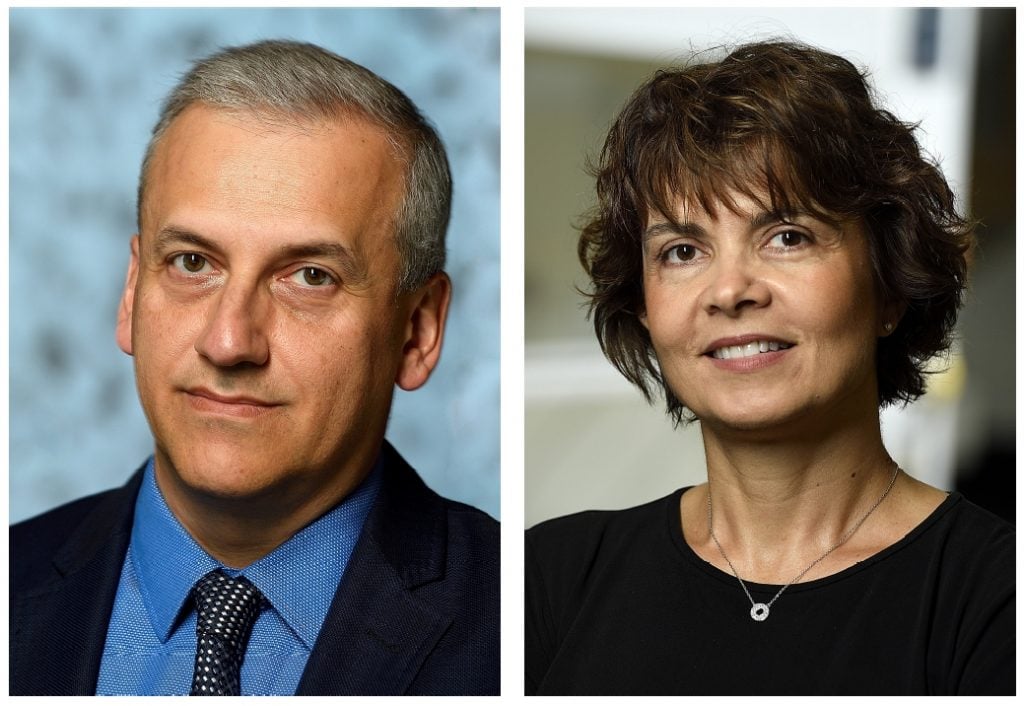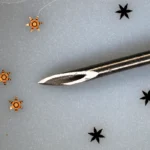Michael Tsapatsis and Efie Kokkoli join INBT

Efie Kokkoli
Efie Kokkoli, a targeted drug delivery specialist, joined the INBT and the Department of Chemical and Biomolecular Engineering faculty as professor on September 1. Kokkoli arrives from the Department of Chemical Engineering and Materials Science at the University of Minnesota, where she served as professor, Shell Land Grant Chair, and director of undergraduate studies.
Kokkoli’s research focuses on the areas of DNA nanotechnology, multi-targeted gene and drug delivery, and the design of biopolymers and responsive hydrogels. With the goal of directing nanoparticles capable of carrying cancer drugs to tumor sites while sparing non-cancerous areas, her group concentrates on designing biomaterials ranging from polymeric nanoparticles to DNA nanotubes that respond best under certain conditions, like temperature or pH, and have specificity for cancer cells.
“We are looking for specific interactions between cancer cells and nanoparticles,” Kokkoli says.
Her move to Johns Hopkins will facilitate the next step in her research, Kokkoli says. The opportunities to collaborate across the Whiting School and with researchers at the School of Medicine will generate new ideas and allow her work to become more translational, she says.
“When you think about Johns Hopkins, it’s the mecca of bio,” Kokkoli says. “It will be like my playground, an opportunity to get involved in new problems, to brainstorm and develop ideas about designing new materials. I really look forward to the new collaborations I will hopefully establish there.”
Kokkoli earned an undergraduate degree in chemical engineering from Aristotle University of Thessaloniki in Greece, and a master’s and PhD at the University of Illinois at Urbana-Champaign under the direction of Chip Zukoski. She did her postdoc with Matt Tirrell at the University of Minnesota and the University of California, Santa Barbara. She has received the Camille Dreyfus Teacher Scholar Award and an NSF CAREER Award, and was inducted into the AIMBE College of Fellows.
Michael Tsapatsis
Michael Tsapatsis, Bloomberg Distinguished Professor of Chemical and Biomolecular Engineering with a joint appointment in the Applied Physics Laboratory, joined the department and INBT in September. Tsapatsis, an expert in molecular sieve membrane, and adsorbent and catalyst synthesis. Before joining JHU, Tsapatsis was on the faculty in the Chemical Engineering Department at the University of Massachusetts Amherst for nine years, followed by 15 years as a faculty member at the University of Minnesota, where, at the time of his departure, he held the Amundson Chair and the McKnight Presidential Endowed Chair in Chemical Engineering and Materials Science.
His teaching interests lie in reaction engineering, catalysis, separations, transport phenomena, and process and product design with an emphasis on energy efficiency and process intensification. In his research, Tsapatsis combines principles of reaction engineering, mathematical modelling, and materials science with the long-term goal of making industrial production of chemicals both cleaner and more energy efficient. His research group is designing, synthesizing, and testing materials that will achieve these objectives while remaining low-cost, reliable, and efficient to meet a chemical plant’s production needs when brought to scale. The group is also targeting the development of new chemical pathways, including those for the production of chemicals from renewable sources.
At the fundamental level, Tsapatsis is interested in hierarchical multi-functional materials design based on molecular engineering, and control of nucleation, directed assembly, and crystal growth at the molecular and nanometer level. Tsapatsis’ group research is highly collaborative and interdisciplinary. It is strengthened by collaborations with experts in high resolution imaging, computational chemistry, and process synthesis/design/optimization to achieve specific reaction engineering goals and to advance the frontiers of materials science and inorganic chemistry. Recent examples of breakthroughs accomplished by his research team and extensive network of collaborators in academia and national laboratories is the discovery of zeolite nanosheets (extremely thin silicate crystals with molecular-sized pores) and their use as thin film ultra-selective separation membranes (Science 334, 72-75 (2011) and Nature 543(7647), 690-694 (2017)) and catalysts (Science336, 1684-1687 (2012)), and the development of a manufacturing method for thin film metal-organic-framework (MOF) membranes (Science 361, 1008-1011, (2018)).
Tsapatsis received an Engineering Diploma (1988) from The University of Patras, Greece, and MS (1991) and Ph.D. (1994) degrees from the California Institute of Technology, where he worked with G.R. Gavalas and was a post-doctoral fellow with M.E. Davis (1993/94). For his contributions to the design and synthesis of zeolite-based materials for selective separation and reaction, Tsapatsis was elected to the National Academy of Engineering in 2015. He is a recipient of awards including the Breck Award from the International Zeolite Association, and the Alpha Chi Sigma Award for Chemical Engineering Research and the Charles M.A. Stine Award for Materials Engineering & Sciences from the American Institute of Chemical Engineers. Approximately 50 of Tsapatsis’ PhD graduates and former postdoctoral fellows are using their skills to advance the chemical and microelectronics industries, and approximately 25 are professors contributing to education and transformative research.





